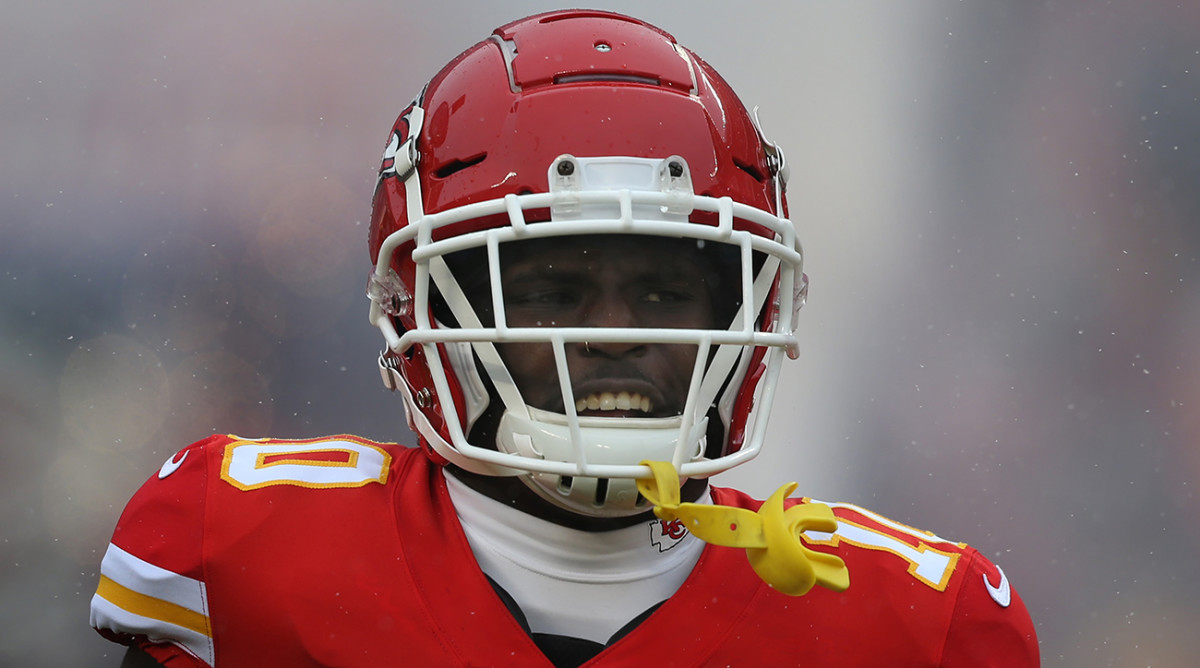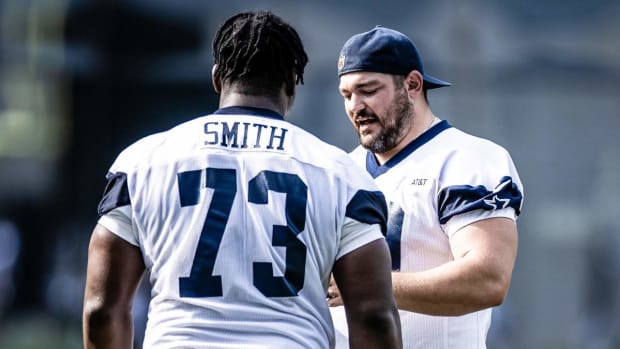How the Audio Recording of Tyreek Hill Alters His Legal Standing, NFL Future

A shocking audio recording of Kansas City Chiefs wide receiver Tyreek Hill and his fiancée, Crystal Espinal, could dramatically change how the law and the NFL respond to the controversy surrounding injuries sustained by their three-year-old son.
A few weeks ago, the couple’s son was taken out of their custody and put into the care of another home. The removal occurred after two incidents at Hill and Espinal’s home in March. Overland Park Police Department had arrived at their home to investigate potential battery and child abuse. On Wednesday, Johnson County District Attorney Stephen Howe announced that neither Hill nor Espinal will face criminal charges. Howe’s conclusion was based on uncertainty as to which person or persons committed a crime.
As I explained on The MMQB yesterday, a lack of certainty as to which person committed a crime means a jury would probably find reasonable doubt and thus not convict. At the same time, Howe expressed certainty that a crime against a child was committed. He also left open the door to restarting the investigation, particularly since there is a five-year statute of limitations under Kansas law for battery and many other criminal offenses.
How the recording describes criminal conduct
KCTV5 published the 11-minute recording Thursday evening. According to KCTV5’s Angie Ricono, the recording occurred at an unspecified date while Hill and Espinal were walking in Dubai International Airport. The recording was intended to be an “insurance policy” for Espinal, though as explained below, Espinal might have unwittingly ensured that she’ll be charged with crimes. Ricono also says that the recording has been “passed around,” which could raise questions about chain of custody and authenticity.
On the recording, Hill frighteningly tells Espinal, “you need to be terrified of me too, b----.” For her part, Espinal is heard asking Hill why their son says “Daddy” broke his arm. She also accuses Hill of “grabbing onto” their son, though she alternatively suggests the son’s injuries might have occurred due to him falling.
Hill is heard categorically denying that he broke their son’s arm. He insists, “I didn’t do nothing.” Espinal then asked him, “Why does [our son] say ‘Daddy did it?’” Hill dismisses the point and claims their son’s account isn’t reliable. “I don’t know,” Hill insists. “He says Daddy does a lot of things.” Espinal didn’t believe him, insisting that, “a three-year old isn’t going to lie about what happened to his arm.”
Espinal levels other serious allegations against Hill during the conversation. She claims that as a method of disciplining their three-year-old son, Hill requires him to “open up his arms” so that Hill can punch him in the chest. Espinal also accuses Hill of using a belt on their son. Hill doesn’t seem to dispute those allegations, though he doesn’t directly admit to them, either. He instead maintains that Espinal is the one who uses a belt, an assertion that she denies.
If Espinal set up the recording to protect herself, she made a horrendous decision in admitting to multiple crimes on that same recording. She incredibly admits, “I rode for you against that Detective and [Child Protection Services] people,” including when government officials asked her about the son repeatedly saying, “Daddy punches me.”
In Kansas, like in other states, it is a crime to obstruct justice. Indeed, Kansas law outlaws “interference with law enforcement,” a crime that includes knowingly reporting false information to the police and impeding in investigation. If Espinal (and Hill) knowingly signed statements denying acts that they know occurred, they could also be charged with perjury. Further, they could be charged with criminal conspiracy if they coordinated an attempt to conceal a crime.
Authenticity and admissibility of the recording
Before relying on the recording to charge Hill and Espinal, Howe and his team will attempt to authenticate the recording. The audio appears to be of Hill and Espinal, but that needs to be validated. The fact that the recording may have been passed around could motivate attorneys for Hill and Espinal to raise suspicions that the recording might have been altered or manipulated. Whether that type of argument would have any traction is unknown.
The admissibility of the recording is also an important issue. Kansas is a “one-party” state for recordings. This means the recording would be inadmissible unless at least one party to the recording consented to being recorded. KCTV5’s report suggests that Espinal secretly recorded her conversation with Hill. If that account is correct, then the recording should be admissible since Espinal—as the recorder—would have consented to her own recording. However, if a third party made the recording, then it would not automatically be admissible (it would still be possible for admissions of crimes on the recording to be considered admissible).
Potential charges for Hill and Espinal—and why prosecutors might try to get Espinal to testify against Hill
If Hill and Espinal are charged with crimes, they could face a wide range of offenses. Those offenses include abuse of a child, a felony. It occurs when an adult “cruelly beats” or “tortures” a child, or when a parent or guardian inflicts “inhumane corporal punishment” on a child. If it were true that Hill punched his three-year-old in the chest and beat him with a belt, he would likely face a charge for abuse of a child. Some parents might insist that using a belt on a child can be an appropriate form of discipline. Whether or not that is correct for children of a certain age, it’s a less defensible position when the child is only three years old.
As heard on the recording, Hill accuses Espinal of beating their son, so she too could face the same charge for abuse of a child. Both could also face charges for battery, which refers to knowingly or recklessly causing bodily harm to another person. As noted above, they could also face charges for interference with law enforcement, perjury and conspiracy.
If Hill and Espinal were charged, Howe would likely try to reach a plea deal with Espinal where she agrees to testify against Hill in exchange for a lesser penalty for her. This approach would be especially probable if Espinal is willing to share emails, texts and other evidence that would help prosecutors secure a conviction against Hill.
Potential fallout with the Chiefs and NFL
At this point, Hill’s future with the Chiefs and NFL are secondary concerns. He could soon face criminal charges and potential jail time. That said, it will be difficult for the Chiefs to continue to employ a player who chillingly tells his fiancée, “you need to be terrified of me too, b----.” And with Hill, this kind of warning was no idle threat. Four years ago, Hill pleaded guilty to domestic assault and battery after he hit Espinal—who was eight weeks pregnant at the time—in both the face and stomach, and he strangled her as well. The Chiefs were faced with an analogous situation last year with Kareem Hunt after a video surfaced of his hotel altercation with a 19-year-old woman. The team cut him.
Likewise, the Chiefs now have evidence that Espinal has seen Hill repeatedly punch a three-year-old child in the chest. It’s also possible that Hill broke that child’s arm, though Hill denies it.
Late Thursday, Chiefs general manager Brett Veach held an unplanned press conference to discuss Hill. Veach announced that he and other Chiefs officials were “deeply disturbed” and “deeply concerned” by what they had heard on the recording. With that in mind, Veach announced that Hill has been separated from the Chiefs and will no longer take part in team activities. Veach also declined to offer a timetable as to when and under what conditions Hill’s exclusion from the team would end, only saying it would continue “for the foreseeable future” as the team investigates. The temporary separation would become permanent if the Chiefs release Hill.
The NFL is also poised to severly discipline Hill, with a lengthy suspension a high possibility. Hill’s menacing comments alone likely constitute conduct that is detrimental to the league. There is no urgency for the NFL to act, however, since the Chiefs have removed Hill for an indefinite period and training camp is a few months away. The NFL can take its time to collect facts, interview witnesses and make sure its conclusions are as accurate as possible. Particularly in the wake of the Ray Rice and Adrian Peterson off-field conduct issues (Rice dragged his fiancée and Peterson beat his four-year-old son with a tree branch), the league knows that its image with fans and sponsors is affected by perceptions of players committing violent crimes.
Whether Hill agrees to cooperate with the NFL is another matter. As I explain in a separate The MMQBpiece, Hill would have legal reasons to worry that admissions to the NFL could be subpoenaed by prosecutors.
Michael McCann is SI’s legal analyst. He is also Associate Dean of the University of New Hampshire School of Law and editor and co-author of The Oxford Handbook of American Sports Law and Court Justice: The Inside Story of My Battle Against the NCAA.





































